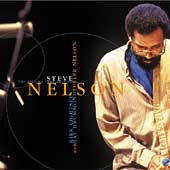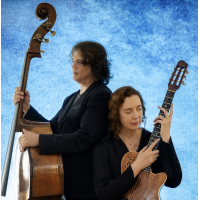Home » Jazz Articles » Interview » Bob Cunningham
Bob Cunningham
Back when I was 12 and joined the school orchestra the bandmaster gave me a bass and handed me a bow, and I looked at the bow as if to say 'What in the hell do I need this [for]?'
 Bassist Bob Cunningham is another example of a talented, underrated and uderappreciated musician. Born in Cleveland in 1934, Cunningham arrived in New York in 1960, hit the ground running and hasn’t stopped, appearing on countless recordings and gigging with all time greats such as Dizzy Gillespie, Max Roach, Sun Ra, Abbey Lincoln and Yusef Lateef. His first and only recording as a leader, Walking Bass (Nilva), was just reissued, and he’s once again participating in the annual summer series Jammin’ on the Hudson, which takes place on Riverside Drive. He is also part of a show entitled Serenade the World, celebrating the life and work of Oscar Brown, Jr.
Bassist Bob Cunningham is another example of a talented, underrated and uderappreciated musician. Born in Cleveland in 1934, Cunningham arrived in New York in 1960, hit the ground running and hasn’t stopped, appearing on countless recordings and gigging with all time greats such as Dizzy Gillespie, Max Roach, Sun Ra, Abbey Lincoln and Yusef Lateef. His first and only recording as a leader, Walking Bass (Nilva), was just reissued, and he’s once again participating in the annual summer series Jammin’ on the Hudson, which takes place on Riverside Drive. He is also part of a show entitled Serenade the World, celebrating the life and work of Oscar Brown, Jr. Cunningham is an introspective, diffident man with a sly sense of humor and a sharp memory. Although he’s slight of build, his sinewy forearms are strong evidence of the years he’s spent honing his craft. The interview took place in his Brooklyn home, located in a tree-lined oasis in a section of Brooklyn so quiet and rural-looking that one might easily think that the subway somehow went up I-95 to New England.
AllAboutJazz: Your first instrument was the piano but eventually you discovered the bass.
Bob Cunningham: I had friends who played saxophones and trumpets, and I wanted to play the saxophone. So the way to go about that was to get into the school band. You get a clarinet first, and from there you move to saxophone. But there were no clarinets or saxophones available ‘cause I was late in applying for a spot in the band. They offered me a violin, viola, cello and bass. So I said, “Well gee, if I take the bass at least I can play along with my friends”. The guy gave me a bass and a bow, and I started playing that and I just fell in love with it.
AAJ: What was it about the bass that attracted you? Was it the way it’s built, was it the sound?
BC: No, it’s the way that it vibrates! When you pluck it the whole body (Cunningham shakes his arms) shimmies!
AAJ: You got to New York in 1960.
BC: Yeah, October 11th, 10:30 p.m.
AAJ: Broke?
BC: No, I had a little something but New York didn’t take long to break me. I drove here and I parked in the lot next to the YMCA where I was staying, down on 24th Street in Manhattan. It was eight dollars for 24 hours, so I figured I could manage that for a week. I put my car in, then I took it out and went to Birdland or somewhere. I took the car back, put it in, and the guy asked for another eight dollars! I told him “I got my ticket here, I paid for the day”. He says, “No, no. Every time you go in and out of here you gotta pay again!” So that was my first awakening to New York.
AAJ: You didn’t read the fine print.
BC: Or hear the fast talk.
AAJ: Since you arrived here you’ve recorded with a who’s who, a roll call, of great musicians.
BC: Well, it’s been with some of the very fine musicians and people that have really moved music, so that’s been a blessing. That’s what I came here to do. In fact, I was with a very fine group before I left Cleveland. We were making good money working six, seven nights a week, and after hours spots on the weekend, and commercial recording during the day, doing jingles and things like that.
AAJ: Sounds like you were having a good time. What made you decide to make the move to New York?
BC: Well, the group that I was playing with was a fine group, but we weren’t going to the different places around the world that I thought we should be going [to], so I severed my ties temporarily with Cleveland. I [knew] a bassist named Morris Edwards who played with Illinois Jacquet, and I met him every time they came to Cleveland. So when I got to New York Morris was one of the few people that remembered me. So many people came to Cleveland and said “When you get to New York, call me.” But Morris remembered and he hooked me up with one of New York’s finest bass players, guy by the name of Ben Tucker, who was playing with Marian McPartland and Billy Taylor. He had a room available in his apartment in Brooklyn and I stayed with him for a few months.
AAJ: I just listened to your CD (Walking Bass) and in your version of “Manteca” there’s a refrain you repeat throughout that goes “We always go back to Dizzy.” Two of the songs on the disc are by Dizzy, and you dedicate the album to him. What was it about Dizzy that inspired this reverence?
BC: The intensity of his seriousness about the music, [and his] focus on quality. I remember the first rehearsal I had with the band was at his home, which was in Corona [Queens], around the corner from Louis Armstrong. I was supposed to be there at 12 o’clock and I got there at 12:05. He says “Bob Cunningham, you’re late.” And he’s got this pseudo-serious look on his face, and says “You know, you’re in the rhythm section and time is of the essence.” And my jaw fell. He was very serious but he had a way of tongue-in- cheeking his lines.
AAJ: It took a long time for you to do your first recording as a leader. Was that a function of opportunity?
BC: It was an opportunity that came to me from drummer Alvin Queen, who was developing a recording company. Elvin Jones, who happens not to be in the best of health these days [Ed. Jones passed away as of press time] , introduced Alvin Queen [to me]. So that’s how I got my first record session. I hadn’t been working that much as a leader at that point, and I just hadn’t taken the initiative to be aggressive about it. I guess one reason why I wasn’t so aggressive [was that] many of my acquaintances who had made records were so unhappy with the relationship with the record companies they were working for. Record companies tend to make a minimal amount of recordings, 10,000, 5,000, and that’s the beginning and the end of it. After six months or a year you can’t find the records. They’re not in the stores, some of the shops have shipped some of them back, and the record company sells them as closeouts, and they say they lose money on them, so they wanna charge the artist back for money they lost! That was disheartening to a lot of artists and I didn’t want to get into that kind of a bind. And I guess I’m a procrastinator. But this deal with Alvin Queen came along some years later, and it was a good deal, and I had arrangements with him where once he stopped producing it I had the rights to produce it.
AAJ: When I was in college the school radio station had a jazz show from 1-4 in the afternoon, and they always ended the show with the Clayton Brothers’ version of “Walking Bass”. I loved that song and I love the spin you put on it.
BC: Okay, “Walking Bass”, that’s a poem by Keeter Betts, that’s not mine. That song was given to me by another bassist, Brian Smith, that’s how I came to be familiar with that particular poem, I call it. Today they’d call it a rap. I’ve never heard it by the Clayton Brothers. This is something I would look for. I would even take it upon myself maybe just to call the Clayton Brothers.
AAJ: Something I noticed when I listened to Walking Bass is that you like to bow as much as you like to pluck.
BC: Back when I was 12 and joined the school orchestra the bandmaster gave me a bass and handed me a bow, and I looked at the bow as if to say “What in the hell do I need this [for]?” Five minutes later he had me bowing the bass. What we were playing in the orchestra was a lot of band music and orchestral music. I was playing primarily tuba parts and the tuba plays long notes sometimes. With the bow, you can sustain the sound, and I like this because it’s more horn-like, it’s more vocal, and it’s a beautiful sound. You can sing, cry, holler, moan. Once you pluck, it’s gone. It amazes me that out of 100 bassists, maybe only 50 of ‘em own a bow. And out of that 50, probably only ten percent of ‘em try to bow anything. And 50 percent they just bow the last note at the end of the song. It seems like such a waste. The other thing about it is that if you’re not playing that bow constantly it’ll say ugly things and embarass you in public.
AAJ: One project you’re currently involved in is a show being put on by the National Black Theater.
BC: Yes, it’s called Serenade the World, which is a show inspired by the life of Oscar Brown, Jr., in my opinion one of this country’s underappreciated artists, somebody that creates art that flows from love, and left a musical legacy filled with positive and meaningful messages. I guess his most famous song is “Signifying Monkey”. Some people even consider him the father of rap because of what he wrote and how he structured his lyrics. The show was put together by the star, Genovis Albright, and I’m part of what’s called the Oscar Brown, Jr. Trio, with Phil Young on the drums and Ann Belmont playing the guitar.
AAJ: Talk a little about "Jammin’ on the Hudson."
BC: It’s a summer series at Riverbank State Park on 145th Street and Riverside Drive, right on the river. The concerts take place on the second and fourth Sundays of every month. The concerts go from 4 to about 6:30 pm. Sometime we get happy and go on until 7 pm. And it’s a beautiful time of day, with the sunset in the background. They have a nice outdoor theater and the weather’s usually nice that time of year, and if it’s not they have a very nice indoor space with bleacher seating. Five years ago we started off playing in front of 400-500 people; now we get two or three thousand for the performances. I’ve been fortunate to have been able to have long term engagements at nice places here in New York. Sometimes you find yourself reaching for other people’s dreams because they think that’s where you should go from where you’re at. I came here and everything I’ve wanted to do I’ve done. I don’t know how much more you could ask for.
Recommended Listening:
– Dizzy Gillespie - An Electrifying Evening with the Dizzy Gillespie Quintet (Verve, 1961)
– Ken McIntyre - Way, Way Out (United Artists, 1963)
– Walt Dickerson - Impressions of “A Patch of Blue” (MGM-Verve, 1964)
– Freddie Hubbard - Backlash (Atlantic, 1966)
– Gary Bartz/NTU Troop - Home! (Milestone, 1969)
– Bob Cunningham - Walking Bass (Nilva, 1985)
Photo Credit
Hugh Talman
Tags
PREVIOUS / NEXT
Support All About Jazz
 All About Jazz has been a pillar of jazz since 1995, championing it as an art form and, more importantly, supporting the musicians who make it. Our enduring commitment has made "AAJ" one of the most culturally important websites of its kind, read by hundreds of thousands of fans, musicians and industry figures every month.
All About Jazz has been a pillar of jazz since 1995, championing it as an art form and, more importantly, supporting the musicians who make it. Our enduring commitment has made "AAJ" one of the most culturally important websites of its kind, read by hundreds of thousands of fans, musicians and industry figures every month.




















